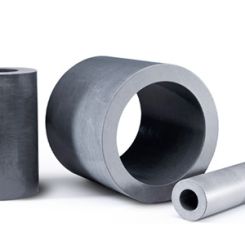
Data centers have several challenges with getting the best possible performance from their cooling systems. These systems need to be designed for robust operation due to the high internal load per square foot of space and year-round cooling requirements while keeping maintenance costs to a minimum. Data centers also have unique space temperature requirements compared to comfort cooling applications, which can present operational challenges for certain types of compressor systems.

Oil-Free Compressor Technology
Traditional compressors with an oil management system require oil for lubrication between the motor shaft and bearings, forming a seal to keep refrigerant from traveling in the wrong direction. The oil management system is a complex system typically consisting of parts such as an oil separator, oil cooler, heaters and pumps. These parts add cost to the price of the chiller and require frequent maintenance over their operational life.
Oil-free compressors using magnetic bearings create a magnetic field that allows the motor shaft to levitate and avoid metal-to-metal contact. This eliminates the need for oil as a lubricant and results in a simpler chiller system design without the cost of an oil management system. It also has fewer maintenance requirements compared to traditional oiled systems.
Operation in Challenging Environments
Oil-free compressors are designed to operate in challenging environments that may restrict the use of traditional oiled compressors. This is achieved by eliminating the oil management system, along with the cost of installing the components, which is required by traditional oiled compressors to ensure the bearings do not overheat.
With the elimination of the oil management system, additional benefits can be achieved, such as providing year-round cooling during cold ambient temperature conditions. Cold ambient temperatures during winter typically result in “low lift” operating conditions, where the difference between the compressor saturated discharge temp and saturated suction temp is small. Low lift conditions can be a challenge for oiled compressors, as oil movement can be restricted at these conditions. As a result, minimum lift is typically required for oiled compressors to ensure proper oil circulation.
Since oil-free compressors do not have an oil management system, this issue is not a concern.
Maintenance
Less obvious benefits of oil-free compressor technology are reduced maintenance needs and related costs. Removing oil from the system allows for a simplified chiller design with fewer mechanical parts, and it avoids maintenance tasks such as analyzing the oil for contaminants and changing filters.
A typical oil management system adds design complexity. It includes such components as an oil separator (which separates the oil from the refrigerant), oil cooler (which reduces the temperature of the oil, since hot oil loses some of its lubrication properties), oil heater (which boils off the refrigerant from the oil to prevent dilution) and oil pump (which circulates the oil through the system).
Performance Over Time
Removing oil from the chiller system can provide many benefits. Over time, oil deposits in the chiller’s heat exchangers can create an insulated barrier on their tubes, degrading the chiller’s efficiency and capacity. Independent studies such as from the American Society of Heating, Refrigerating and Air Conditioning Engineers (ASHRAE) Research Project Report RP-751 have found most traditional oiled chillers installed in the field are “overcharged” with oil, resulting in degraded performance.
With oil-free compressor designs, the performance advantages achieved through the elimination of oil from the chiller system can be maintained throughout the life of the compressor. Since there is no oil to inhibit performance and no mechanical wear for internal components, the compressor’s performance can remain unchanged for its entire operating life.
Oil-free compressor technology also eliminates metal-to-metal contact between the motor shaft and the bearings. Since the motor shaft levitates, there is no mechanical wear on these key components. With traditional oiled compressors, metal-to-metal contact occurs between the bearings and the shaft, which will degrade performance over time.
Expanded Use
Advancements in technology have expanded the operating map and capacity of oil-free, magnetic bearing compressors to meet the needs of data center cooling. Environmental concerns, along with the reduced maintenance requirements, have driven many data centers to use air-cooled chillers. This trend requires oil-free compressors to run in high lift areas of the operating map.
High lift operating conditions occur where the difference between the compressor saturated discharge temperature and saturated suction temperature is high, such as in air-cooled chiller applications operating at extreme ambient conditions during the summer. Recent improvements in magnetic bearing design have allowed oil-free compressors to operate at these conditions as well as generate higher cooling capacities as cooling needs increase.
Oil-free compressor technology can be an effective solution to meet the demanding needs of data center cooling. They provide benefits in performance and maintenance, a wide operating map to support a range of application conditions and low maintenance costs over the life of the chiller system.
For more on compressors, visit pumpsandsystems.com/tags/compressors.

